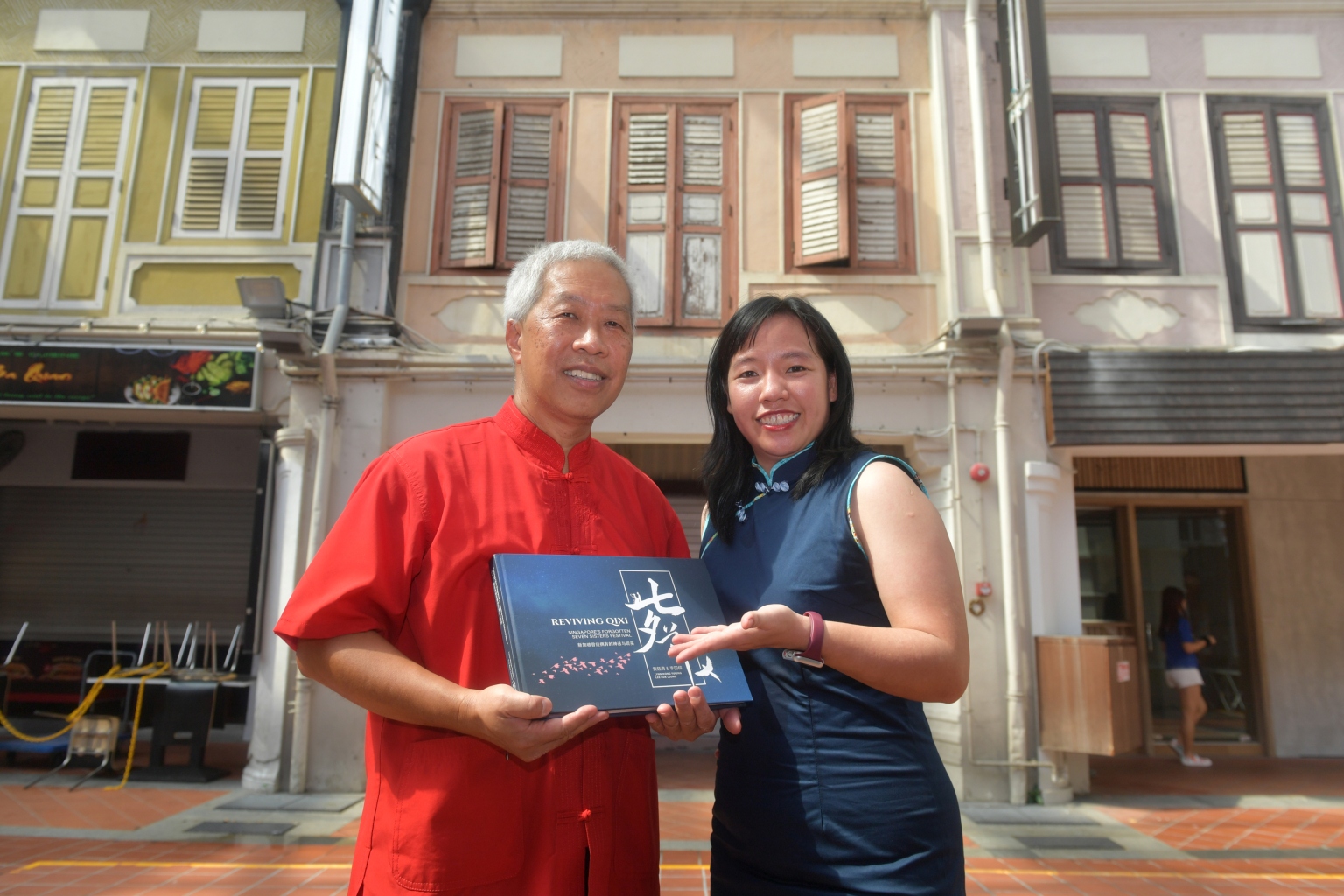Bilingual book on long-lost Qixi Festival launched, authors hope to bring celebration back
Sign up now: Get ST's newsletters delivered to your inbox

Mr Lee Kok Leong (left) and Ms Lynn Wong at the book launch in Chinatown.
ST PHOTO: ALPHONSUS CHERN
SINGAPORE - A book on the long-lost Qixi Festival in Singapore was launched on Saturday in Chinatown, where it used to be celebrated until the 1970s.
Reviving Qixi: Singapore's Forgotten Seven Sisters Festival documents the rise and fall of the festival and provides important signposts on how to revive it.
The authors, heritage researchers Lynn Wong and Lee Kok Leong, said at the launch in Smith Street that they hope to bring back the festival with their book, which is written in both English and Chinese.
The Qixi or Seven Sisters Festival is the only Chinese festival here that has dropped from public consciousness. It falls on the seventh day of the seventh lunar month and is associated with the legend of the brief reunion of the cowherd and the weaver girl on this day.
It was one of the most important traditional Chinese festivals for women in Singapore in its heyday in the 1930s to 1950s.
The other major festivals celebrated by the Chinese are still observed to varying degrees in Singapore today. They are Chinese New Year, Qing Ming Festival, Duan Wu Jie or Dragon Boat Festival, Zhong Yuan Jie or Hungry Ghost Festival, Mid-Autumn Festival, Chong Yang Festival, and Dong Zhi or winter solstice.
Plans for this book were announced at the Remembering Seven Sisters Festival panel discussion organised by the Singapore Heritage Society in 2019.
Dr Chua Ai Lin, executive director of the society, wrote in the foreword that the book does more than document a long-forgotten festival. It suggests that there is much room for Singapore to learn from its counterparts in East and South-east Asia, where the festival is still being observed.
The book is partially funded by the National Heritage Board, with the rest of the cost covered by the authors.
Besides looking into ancient Chinese texts to trace the origins and developments of the festival, the authors examined the customs brought over to Singapore by early Chinese women migrants since the mid-19th century.
These migrants included the majies, women who worked as domestic helpers in Singapore between the 1930s and 1970s, samsui women and factory workers. The authors also investigated how the festival went from heyday to mayday here, looked at its development in China, Hong Kong, Japan and Malaysia, and sought community views on how the festival can be revived.
"The revival of a long-lost festival is not going to happen with just a book launch," said Ms Wong, 33. "Sustained partnerships, collaborations and involvement of the community are needed."
Beyond the 236-page full-colour, hard cover book, the authors have been giving talks about the festival on different platforms.
Mr Lee, 61, was the consultant of the Seven Sisters' Sonata, a stage production which featured stories of the majies through Chinese chamber music and dance. It was performed by Ding Yi Music Company at the Singapore Chinese Cultural Centre in May.
A Qixi-themed banquet in commemoration of the majies was held by Ms Wong at Red Star Restaurant in July for about 20 heritage and clan associates.

On Aug 3, Ms Wong spearheaded the Qixi Festival celebration in Kong Chow Wui Koon, a Chinese clan association in New Bridge Road. It featured an introduction of the festival, Qixi poetry recital, an exhibition of miniatures and crafts and traditional games such as needle-threading, as well as traditional Qixi snacks and desserts. The snacks include “seven sisters pastry”, also known as “gold coin pastry”, and the “seven sisters fruit”, which is the Chinese chestnut that bears fruit during the festival.
The free event was attended by more than 100 people.
Ms Wong is also planning a documentary film and is in talks with clan associations in Chinatown to organise the next Qixi Festival celebration.
The public can look forward to a series of activities leading up to the day, including handicraft workshops where works by participants will be displayed during the festival.
Mr Lee said a liveable city must have its "soul" and collective memories, beyond being a modern and accessible living space.
"There can be a broader understanding of the intangible values and customs of the people who live their lives there, thereby restoring the depth of history and the warmth of humanity," he added.
- Reviving Qixi: Singapore's Forgotten Seven Sisters Festival costs $77 and can be purchased at this website.


